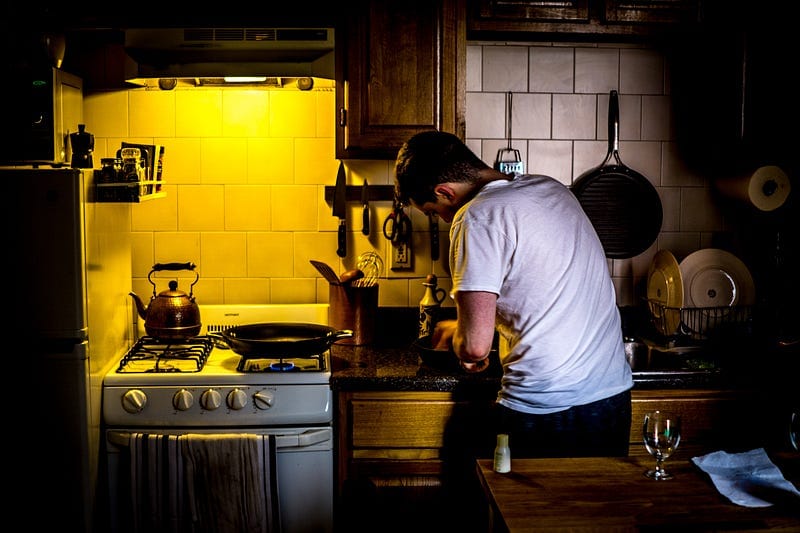Three Things I Learned From The French Laundry

She stands perched on a plastic chair, watching every single move, yet ignoring every word she hears. Mostly because the little happy creature is announcing that she’s my sous chef.
I’m also having to explain why, like an idiot, I just broke my hollandaise sauce. It’s mad science at its best. Of course, we’re setting a low bar on the term best.
I’m a Taurus with a Libra moon, and if you happen to be into astrology at all, you might understand before I explain it. The quick explanation is that I look for the good things in life, the blissful experiences that don’t always cost money. I try to make it cost as little as possible, usually. I need those moments, I crave those moments where the world spins and you really feel like you’re alive.
What we consume can often provide those elusive blissful, almost orgasmic moments in time.
In this case, it is the mother of invention known as scarcity, I have one egg, a pat of butter, some lemon juice, and a new pack of milanesa steak that soon will be put to several more invented meals that border on anything but normal.
It could have been a steak and egg diner special, but no. Why be typical. I’m trying to warp this little mind to learn the three things I learned from a single visit to Thomas Keller’s French Laundry.
The little face looks at me like I’m a circus clown that needs to show her a new trick she hasn’t seen before. This happens almost every day. Every day a new recipe I’ve never made before, trying to make something extraordinary out of the most normal things I have on hand.
This is an egg white, cooked in the style of uovo all’occhio di bue. Okay. So that’s just an egg white, fried in olive oil. You have to work hard to get it to look like the pictures. She doesn’t care. She’s excited as if I’d pulled a half dollar from behind her ear.
I had a small round from the milanesa, about the size of my palm that I cut into three strips and pounded paper-thin to resemble bacon. She helps me salt it, high and sparse, and then watches with glee as I grind the pepper on top, simulating black pepper bacon. I place to fry on the other eye, in a larger pan as I’m frying the egg.
There are some mini portobello slices that I have made thinner, isolated them in the same pan with the meat for a moment as I move the egg white onto the plate.
“Look! I didit all by myself!” I hear. Better to just keep working and not respond. Timing is everything with this stuff.
I already have the ingredients together for the hollandaise, and it’s not the traditional way of doing things, but the one I made yesterday with the other egg turned out well, so why not?
Moving the cooked strips to the plate, I shift the mushrooms to the smaller egg pan so they can finish, a touch of lemon to match the sauce I’m about to make.
The mushrooms find their place on the plate, and I move the smaller pan off the heat. I want enough heat to bring the sauce together without cooking it.
I was wrong.
The heat immediately scrambled the “sauce”. So I had a refined scrambled egg slurry with a nice lemon and thyme flavor. You can’t win ’em all.
She absolutely did not care.
Wait, I’m confused…
I’ve written about this before, but the fact that I was cooking anything at all came about through a long and varied path of other peoples desires for good food. It wasn’t a part of my childhood or anything.
I remember the first time I had genuine Italian food. The first time I was taught to pair wines with food in my 20s, roundly embarrassed that I knew nothing about it whatsoever. My father was partial to Manischewitz and whatever wines he had made himself.
Ten years later, and much had changed for the better.
It was that trip to the French Laundry that changed me. If you simply eat a meal and crow about the food, you have done yourself a horrible disservice. It exists as a philosophical monument in and of itself.
This is one of the things of the nouveax foodie culture that agitates me the most.
There are three things that I learned from the visit that have remained with me for the past fifteen years and they can modify complete portions of your entire life and how you live it, provided one listens and lets them color their existence.
Value The What
I had read about this place before I had the desire to visit, in fact, I found out about the French Laundry first from Michael Ruhlman, the idea that food items could be respected for what they were, and treated accordingly was a concept I had been unfamiliar with before that point.
The philosophy of gratefulness begins to seep in when respect for the chain enters the picture. It becomes more about relationships, to those that procure your food, how they treat the product, how the animals are treated if meat, poultry or seafood happen to be involved.
Recently I saw a discussion with a medical doctor who has been performing ground-breaking experimentation on the human stomach, and in part of his comments was the thought or possibly proven fact that vegetation also gives off protective enzymes to try and prevent being eaten.
I’m not saying “don’t eat this or that”, I’m pointing out that mindfulness of what we are putting into our bodies, and giving it the respect and thought that we would if a guest were invited into our home might not be a bad modus operandi. This is nothing new. Thich Nhat Hanh has written and discussed this idea of meal consumption with mindfulness at length.
Value The Who
As I sat in that dining room, attempting to maintain a constant contact with reality from the surreal position I found myself in, I noticed that I was being watched. At first, it’s creepy.
I asked the waiter about it. Michael Ruhlman described the waitstaff as whiteclad angels, or something to that effect. He wasn’t joking. They appear and disappear like they are slipping through dimensions in time. It’s an accurate description.
The answer to my question had ramifications I couldn’t possibly anticipate at the time. I was being watched to determine how I was enjoying the dish in front of me, and that would determine what I would be served next.
The realization seeped in that this wasn’t a room of chefs just trying to be the biggest, baddest culinary masters on the planet. It wasn’t about them.
It was about me.
Once you can wrap your mind around the fact that a room of chefs are creating the best they can execute for the sole purpose of providing you an experience you will remember for the rest of your life, it’s humbling. They are giving you a gift of love. They are pulling themselves out of the mass sum of everything for the sake of your contentment.
It’s the same abdication of self that occurs when a grandmother cooks her heart out for the family, or when a single mother with two jobs creates the best she can from what little she can afford for a bunch of hungry kids that many times don’t appreciate the special sauce comes from the love of the one that prepared the meal.
Or when my late father spent an incredible amount of time putting together a recipe of pork livers that were pressure cooked and easily one of the most incredible things I have ever put in my mouth, and certainly never duplicated again. I didn’t know he could cook.
He said he learned it in Greenland from the Danish cooks. 30 years later, I finally understood he was sharing a piece of his history with me.
We’ve all been guilty.
Value The Why
Motive is important. In today’s culture, we are awash in self-serving ventures to the point that social media survives on the idea.
We all must eat every day. It’s a necessary function. Elevating that function to something extraordinary takes love, focus, and a desire for something better. Many of the best moments, still mental pictures of bliss that I recall usually revolve around an experience with food.
Coffee and a bagel on Sepulveda Boulevard on a Sunday morning, reading LA Weekly while the traffic zipped by.
An ice cold Mexican-bottled Coke and a co-worker’s tamale after moving a half ton of wood chips on a golf course with a shovel.
A luxurious puttanesca with a Bolla Valpolicella, made by Gianni Petro as blankets of snow lay like cotton outside the window. At least the part of the window that could be seen around the giant head of Lukie, the household bull mastiff, who observed the festivities and did not approve of being outside and away from the kitchen.
Chef Keller speaks to these moments. And I can’t really do it better, so I’ll just send you there.
Perhaps the best thing in all of this is the mechanism by which we can all derive more richness in our lives, by thinking about what we are actually eating, who made it possible, and why we should give a damn.
